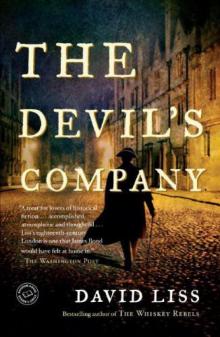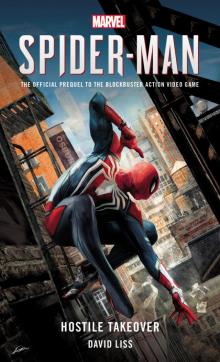- Home
- David Liss
Randoms Page 2
Randoms Read online
Page 2
• • •
Between work, dealing with her terminal disease, and taking the time to bail out her delinquent son, my mother didn’t have much time to cook. Once she had rescued me from the principal’s office, we stopped to pick up Chinese takeout so we could enjoy a quiet evening of sitting at the kitchen table and complaining about my life.
The previous year we had been in Albuquerque, where even in the winter it didn’t get dark until pretty late. Now we were in Wilmington, Delaware, and though it wasn’t yet five o’clock, the sun was already going down. I liked that, for some reason. I liked the cold and the quiet, and how our house was well lit and warm against the early December chill. It was nice and comfortable and safe, except in all the ways it wasn’t. No matter how funny or lively or good-natured my mother might act, I knew nothing was ever going to be comfortable for her again.
“I’m really sorry you had to deal with that stuff today,” I told her.
She put down her disposable chopsticks and leveled her gaze at me. “You’ve got to be kidding me, Zeke. Do you honestly think I’d be angry with you?”
“I know, but I hate that you have to take the time and put up with the stress and all that.”
She smiled. She looked perfectly okay. That was the thing that made no sense to me. She looked so healthy and normal, it was hard to believe that was all going to change. Six months before, my mother had been diagnosed with amyotrophic lateral sclerosis, ALS, also called Lou Gehrig’s disease. It’s a degenerative neurological condition that causes gradual but catastrophic muscle failure. At some unknown point in her future, she would begin to lose the ability to control her limbs, and then, slowly, she would suffer failure in the muscles that allowed her to do things like breathe and swallow and blink. She was going to become a living corpse, trapped within her own failed body. I didn’t want to think about her journey from healthy to disabled to helpless, but sometimes I couldn’t think about anything else.
“Look,” she said, “just promise me you’ll stop threatening your principal.”
We both laughed.
“If I made that joke at school, I would totally get kicked out,” I said.
Now she was serious. “Do not make that joke at school.”
“Mom, I’m not a complete idiot.”
“You’re twelve,” she said. “That means you’re a complete idiot at least part of the time.”
Then came the knock at the door.
I got up to answer it, and when I threw the doors open, I saw two men on the front stoop. I hadn’t turned on the porch light, and their dark suits made them almost invisible. They had grave expressions, stiff postures, and earpieces. They looked scary and governmental.
“I swear, we were kidding,” I said. “I’m not going to threaten my principal.”
The men looked at each other, then at me. “Are you Ezekiel Reynolds?” the taller one asked.
I thought he was about to arrest me, so all I could manage was a nod. I also flicked on the porch light. Just because you are scared doesn’t mean you can’t be polite.
“I’m Agent Jimenez, and this is Agent McTeague. May we have a word with you?”
My mother was now standing behind me. “What’s this about?”
“Ma’am, we would rather not say on the front porch.”
“Do you have a warrant?” My mother had just shifted into she-bear mode.
“Ma’am,” said Agent Jimenez, “it isn’t that kind of conversation.”
“So this isn’t about . . .” My mother decided not to finish that thought.
“Ezekiel’s threats against his principal?” Agent Jimenez asked with death-row seriousness. Then he grinned. “No, ma’am. Your son is not in any trouble.”
My mother sighed. She was clearly feeling less threatened, but she wasn’t quite prepared to let the men into the house. “Look, I’m not comfortable with this, especially considering how vague you’re being.”
“I understand,” said Agent McTeague. “We anticipated some natural reluctance on your part.” He touched his earpiece and said, “We’re go for Renegade.”
I had no idea what that meant, but it sounded cool. I’d never been go for anything, at least not that I knew of.
The doors of one of the black cars in the driveway opened, and more people in suits came out. It was dark and I couldn’t see who they were, only that several of them were standing around one person, as if protecting him. It was only when he stepped into the porch light and was standing just a couple of feet away from me that I recognized him.
“Mr. Reynolds,” he said. “I hope I can have a few minutes of your time.” He spoke in his usual serious but easy tone. It was the kind of voice that let you know he was a friendly guy, but not one you wanted to mess with. I’d heard him use this tone a million times on TV.
“Um, sure,” I said. “Okay. Come on in. Sir. Please.”
I stood aside to let him pass, because that seemed to be the right thing to do when you receive a visit from the president of the United States.
Of America. Just so there’s no confusion.
CHAPTER THREE
* * *
My mom managed not to freak out, which I considered impressive. She invited the president to sit, and he did. She offered him a beverage, and he declined. She stammered only moderately when she spoke. There were more agents in the house now, swarming around as they made sure we didn’t keep any assassins lurking in the pantry or the coat closet. Some of the agents held out what looked like thick metal pens, which, they explained, allowed them to scan for listening devices. It turned out that we had none, which I probably could have told them, considering that anyone with the means to plant a listening device could not possibly care what my mother and I had to say. We tried not to worry about the fact that there were agents moving throughout the house, and more in the backyard, standing at the ready in case, I don’t know, the propane grill decided to attack.
In the living room, my mom and I did our best to ignore all this. Next to the president sat an intense-looking woman with distractingly red nail polish, her coppery hair pulled back tightly and mercilessly clipped into place. She was perhaps in her midthirties, and she wore a severe pantsuit that looked almost military in its cut. She and her clothes were all sharp lines and hard angles, and her eyes were an unfeeling icy blue. She might have been pretty if she hadn’t looked like she ate puppies for breakfast. The president introduced her as Nora Price from the State Department. I had no idea what her job was, but she had the kind of scary expression that made me feel pretty sure she would trample anyone who got in the way of her doing it.
The president pressed his hands together and leaned forward. “Mrs. Reynolds, I apologize that I am going to be somewhat secretive. I’ve come here to ask if your son could be our guest for a few days. I can assure you he will be in absolutely no danger.”
“What?” she asked, her voicing rising several octaves.
Ms. Price smiled, but it was more indulgent than warm, the kind of smile used only by people who have to work hard at appearing nonthreatening. “I can assure you this is a matter of national security.”
I was starting to think that illegally downloading those episodes of Teen Wolf might have been a mistake. I knew the commercials told us that piracy is not a victimless crime. Even so, I wanted to believe the president had other things to worry about. “Why do you need me?” I managed to ask without my voice cracking.
“That’s classified,” Ms. Price said, not kindly. She seemed to have forgotten to appear nonthreatening.
“It needs to be unclassified,” my mother said, “or I’m not agreeing to anything. These agents say he isn’t in trouble.”
“And he isn’t,” the president assured her, taking a much warmer tone than the State Department woman. “All I can tell you is that there is a visiting representative of, uh, shall we say, a foreign governme
nt, who has requested the honor of meeting Ezekiel. I can’t say anything more, so I understand your frustration. I have two daughters myself, and I can imagine I wouldn’t much care for it if someone came to me and proposed what I’m proposing to you. I can only give you my word as your president, and as a father, that your son will not be in harm’s way, and that he will be doing a great service to his country.”
“How long are we talking about?” my mother asked.
“Initially, two days,” the president said. “It may happen that Zeke will choose to participate in a sort of foreign exchange program, and if that’s the case, it will be longer. At that point, you would receive more information.”
“What sort of exchange program?” she demanded. “With what country? Wait, let me guess. You can’t tell me.”
The president smiled, and it was genuine. I had the feeling he had already come to like my mother, as if under other circumstances the two of them could have hung out—gone bowling or whatever. “The only thing I can add is that it will be a unique experience,” he told her. “I do feel very confident that your son will not regret coming with us.”
I looked at the president. “Does it have to be me, or will some other kid work? Sir.”
“It has to be you,” the president assured me.
“Why would some ambassador even know who I am? Is this about my father’s show?” American shows, even unsuccessful ones, can develop followings in foreign countries. For reasons that remain unclear to me, they went wild for Colony Alpha in Estonia.
“The father,” Ms. Price explained to the president, “now deceased, created an unpopular television program.”
Now there’s a way to honor a man’s life.
“It has nothing to do with that,” the president said. “As to why it has to be you, I’m afraid I can’t tell you at this time.”
My mother took a deep breath and squared her shoulders, a sure sign she was about to say something that made her uncomfortable. “I’m sorry, but the answer is no. I’m not letting you take my son unless you give me more information.”
“We don’t actually have to ask you,” Ms. Price said. She sat up straight, and the hard look she gave my mother was nothing short of a challenge. “This is a national security matter, and, as such, we can take him whether you like it or not. If you attempt to interfere, we can arrest you. We don’t want to play it that way—”
The president held up his hand to silence her. “And we won’t. Zeke is not going to be taken against his will, and no one is going to be arrested.”
“So I can say no?” asked my mother.
“My plan,” the president said, “is to stay here until I can convince you to say yes.”
I couldn’t imagine why any ambassador would want to meet me, but I also couldn’t imagine going the rest of my life without finding out. How would I feel, years from now, when I remembered the time the president came asking for my help, and I sent him away?
It seemed to me that this might be a situation I could use to my mother’s advantage. If I could help her, and find out why my government needed me, then everyone would be a winner.
“The thing is,” I said, “if I were to go, it would be hard on my mom, and this isn’t a good time for her to be under stress.”
The president nodded gravely. “Yes, we are aware of her health issues.”
My mother started at this. “That’s none of the government’s business. How, exactly, did my private health-care records—”
Ms. Price cut her off. “National security.”
I spoke up before my mother decided to see what would happen if she gouged out the eyes of someone in the president’s entourage. “Are you aware,” I asked, “that her insurance company has been giving her a hard time about the treatments her doctor wants her to get?”
“Ezekiel!” my mother snapped. Maybe she thought this was no one else’s business, or maybe she had an inkling of what I had in mind. Either way, she was unhappy.
The president raised his eyebrows like he was mildly amused. “Go on.”
He was going to make me say it. “I was wondering if you might be able to smooth some things over, being, you know, the president and all. It would make me feel better to know my mom was getting the care her doctor prescribed.”
The president frowned, deep in serious thought, and there was maybe a hint of the side of him you didn’t want to see. After a moment’s thought, he reached into his jacket pocket and pulled out his cell phone. He pressed one button. “A Mrs. Reynolds is going to be calling your office tomorrow. Have one of your people take her information and make certain her insurance company understands that you want her to receive any treatment her doctor recommends.”
The president then looked at my mother. “That was the secretary of health and human services.” He was typing into his phone as he spoke. “I’m sending a note to my assistant right now to provide you with her direct number. You call her, and you’ll have everything you need.”
My mother looked at him. She looked at me. “Thank you,” she said quietly.
“Now,” the president said, meeting my eye, “are you done playing hardball with the leader of the free world?”
“I haven’t agreed to anything,” my mother reminded him.
“Come on, Mom,” I said. “He said I’d be in no danger.”
“No danger whatsoever,” the president assured her.
I knew what she was thinking. She was wondering if she would have been so reluctant if she hadn’t been sick, and that was what would tip her over to my side. She hated the thought of what her illness would do to me, the kinds of responsibilities that would come my way, the experiences I might miss.
“You’re sure you want to go?” she asked.
“I don’t know what this is about, but I have to admit I’m pretty curious.”
She gave the slightest of nods.
And because I am always thinking ahead, I turned to the severe woman, Ms. Price. “I’ll also need a note excusing my absence from school. Can I get that on White House stationery?”
• • •
I quickly packed a small bag with enough clothes for two days. My mother hugged me several times and told me to call her if I got scared or if I needed to come home. I hated to leave her, and I was already plenty scared, but every time I thought about pulling the plug, my curiosity kicked in. Why, of all the people in the country, did I have to speak to some foreign bigwig? How could it possibly be so important that the president of the United States would drive two hours to Wilmington to press his case? I had to know what this was about.
I did not get to ride with the president, but he stopped me before I got into the backseat of a sedan. He shook my hand and thanked me for being willing to serve my country.
“I appreciate that, sir,” I said, trying to act like I was not flipping out.
“I think you’ll find it interesting,” he said. “And Ezekiel. For the record, I respect how you stood up for your mother’s interests. I know that all of this”—he waved his hands at the sedans and the agents—“must be very intimidating. You’ve got a lot of courage, young man.”
“Thank you, sir,” I said, feeling like a phony. I was sure that if the president had seen me cringing as Tanner Hughes smacked me around, he’d have found some other clueless kid to meet with the ambassador of wherever.
I rode with Agents Jimenez and McTeague, who were polite but not particularly conversational. As we pulled onto the highway and headed toward DC, I finally worked up the nerve to speak. “Do you guys know what is going on?”
Jimenez shrugged. “I am not authorized to answer that.”
“You’re not authorized to tell me whether or not you know?”
“I’m not even authorized to explain what I initially meant.”
“What about you, Agent McTeague?” I asked the agent riding shotgun.
“Is there anything at all you can tell me?”
“I’m not authorized to answer any questions about what I can or cannot answer,” Agent Jimenez said. “Except,” he began, and then he just shook his head. “Wow. That’s all I’m going to say. Wow.” Then he cast a look at McTeague and the two of them burst out laughing.
CHAPTER FOUR
* * *
I thought I was going to the White House. When the president of the United States comes by and says, “Let’s hang,” you figure you’re heading for Oreos in the Oval Office. This turned out not to be the case. The president had dropped by to convince me and my mom I should go along with the Secret Service guys, but he had more important things to do than deal with me.
Our destination was Camp David, which was not as exciting as the White House, but it was still pretty impressive. How many people do you know who have been to Camp David? That’s what I thought.
We passed through several checkpoints and drove down narrow streets dense with groves of wintry, leafless trees that looked spooky in the dark. We finally parked outside a large building that was more hunting-cabiny than I would have imagined. The agents led me inside and through rooms that looked like they had been designed by extremely wealthy pioneers, and brought me to a less rustic-looking office. The severe State Department woman, Nora Price, was sitting behind a desk waiting for me. Or rather, she was there when I entered, and proceeded to ignore me so she could work and I could watch her do it. I stood across from her while she typed away furiously on her laptop. The Secret Service agents had already retreated. Finally, without looking up, she gestured with a flick of her crimson fingernails for me to sit in one of the heavy wooden chairs.
The endless clack clack clack of her fingers on the keyboard didn’t slow, but after about five minutes she said, “I’m sure you are wondering why you’ve been invited here.”

 The Whiskey Rebels
The Whiskey Rebels Renegades
Renegades The Twelfth Enchantment: A Novel
The Twelfth Enchantment: A Novel The Day of Atonement
The Day of Atonement The Devil's Company
The Devil's Company Randoms
Randoms Paleo / The Doomsday Prepper
Paleo / The Doomsday Prepper Rebels
Rebels A Spectacle of Corruption
A Spectacle of Corruption The Twelfth Enchantment
The Twelfth Enchantment The Coffee Trader
The Coffee Trader The Ethical Assassin
The Ethical Assassin The Devil’s Company: A Novel
The Devil’s Company: A Novel The Double Dealer
The Double Dealer The Whiskey Rebel
The Whiskey Rebel A Conspiracy of Paper bw-1
A Conspiracy of Paper bw-1 The Devil's Company bw-3
The Devil's Company bw-3 Marvel's SPIDER-MAN
Marvel's SPIDER-MAN